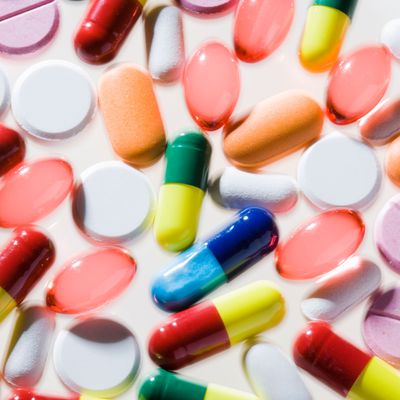
The New York Times Magazine has a fascinating and mind-bending look at the world of placebos — how and why they work, whether they work better in people with certain genes (!), and what the future of placebo research/usage might be.
I especially like the idea that the placebo effect could be partially explained as a response to the intimacy of human ministrations. That it could be “a biological response to an act of caring,” author Gary Greenberg writes, and “that somehow the [doctor–patient] encounter itself calls forth healing and that the more intense and focused it is, the more healing it evokes.” (This is a hypothesis held by one of the placebo researchers that Greenberg follows.)
At the other end of the placebo-research spectrum, another researcher has been focusing on the hard science of placebos — on the quantifiable gene variations and brain enzymes that may also explain their power. Apparently people with different kinds of genes respond differently to different kinds of placebos, which could potentially throw a wrench into all of modern medicine. (Or at least into “a cornerstone” of it: the placebo trial.)
Another compelling hypothesis is that the placebo effect could stem in part from the theatrics of a given encounter — that the more startling and unexpected a session is, the more it might mysteriously activate or otherwise allow for a genuine healing reaction. I’m onboard with the scientist quoted in the story, for instance, whose long-standing pain was ultimately alleviated by a single, unusual acupuncture treatment. I also enjoyed Greenberg’s list of the colorful (and morally suspect?) ways that the placebo effect has demonstrated itself over the years:
Tell someone a normal milkshake is a diet beverage, and his gut will respond as if the drink were low fat. Take athletes to the top of the Alps, put them on exercise machines and hook them to an oxygen tank, and they will perform better than when they are breathing room air — even if room air is all that’s in the tank. Wake a patient from surgery and tell him you’ve done an arthroscopic repair, and his knee gets better even if all you did was knock him out and put a couple of incisions in his skin. Give a drug a fancy name, and it works better than if you don’t.
But if I knew to hope for theatrics, fancy names, and intimate ministrations, might that expectation drain the placebo effect of its power? Shouldn’t we leave placebos alone lest they stop placebifying us?? What is gained from looking behind the curtain?!? Apparently I don’t need to worry. A 2016 Harvard summary concludes: “a placebo can work even when you know it’s a placebo.” And, from NPR: “You might not need to deceive patients to get an effect.”
Fortunately, even after reading the story, the world of placebos still seems impenetrably wild to me, so I can resume holding them in mystical reverence.

